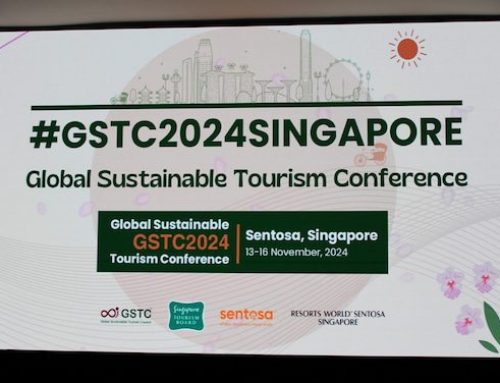The Global Sustainable Tourism Council® (GSTC®) is pleased to announce that the Pacific Sustainable Tourism Destination Standard (PSTS) for destinations has gained GSTC-Recognized status as equivalent to the GSTC Destination Criteria.

In acknowledging the GSTC Recognized status of the Pacific Sustainable Tourism Destination Standard (PSTS), SPTO CEO Christopher Cocker, congratulated the SPTO Division of Sustainable Tourism and GSTC Member TRC Tourism for spearheading the development and implementation of the Pacific Sustainable Tourism Policy Framework (PSTPF) and PSTS. Mr. Cocker emphasized the invaluable role of the PSTPF and PSTS in promoting sustainable tourism practices, empowering SPTO member countries and their local communities by adhering to the GSTC Destination Criteria.
“The GSTC-Recognized Status showcases the joint efforts of SPTO, its Member Countries, stakeholders, partners and TRC Tourism in meeting the Sustainable Development Goals through the PSTPF and the PSTS as its commitment to sustainable tourism. The PSTS provides direction and guidance to develop and implement national sustainability standards for SPTO member countries by acting as a benchmark for each destination to assess current performance. The Pacific Sustainable Tourism Destination Standard will also progressively strengthen support for member countries and their tourism sector in becoming more sustainable through a range of actions and collaborative partnerships; create awareness and encourage visitors to travel responsibly.”
“This achievement demonstrates our partners’ value to our work in the Pacific. The PSTPF and PSTS are key to reaching our shared vision that by 2030, the Pacific Islands will be empowered by and benefitting from resilient, prosperous, and inclusive tourism. I thank TRC for supporting our work, and we owe it to our Member Countries, stakeholders, and partners who have led and contributed time and input to the process,” Mr. Cocker said.
“The Pacific is vast and SPTO takes on a big challenge to support their membership. We’re pleased to lend any support we can to develop a cohesive strategy for a systematic approach to sustainability across the tourism offerings throughout the Pacific. We wish SPTO great success in turning the tides of change!” says Randy Durband, GSTC CEO.
The GSTC-Recognized status refers to the standard itself, indicating that a sustainable tourism standard or system has been reviewed by GSTC technical experts and the GSTC Assurance Panel and deemed the content of the standard or system equivalent to the GSTC Criteria for sustainable tourism. It shows that the set of standards is based on the four pillars of the GSTC Criteria: Sustainable Management, Socioeconomic, Cultural, and Environmental principles.
GSTC Recognition of Standards does not relate to the process of certification (which is a third-party assessment, through an audit, of a tourism enterprise for conformity to a standard). GSTC Recognition of Standards does not relate to accreditation (formal verification that a certification body operates in a competent and neutral manner according to international standards of how to properly certify, which is the highest level of assurance).
The stated scope of the GSTC Recognition is Destinations and coverage is the Pacific Region. The GSTC Recognition is valid until either the standard or the GSTC Industry Criteria are changed.
Currently, 15 destination standards, 21 tour operator standards, 40 hotel standards, and 5 systems have achieved GSTC-Recognized status. The status offers the market proof that these standards adhere to international norms. GSTC Recognition does not ensure that a certification process is reliable, only that the set of standards used to certify are equivalent to the GSTC Criteria. GSTC-Recognized standard owners are encouraged to follow and complete the accreditation process, which assures that the certification process used to apply the standard meets international best practices, transparency, and rigor. A list of GSTC-Accredited certification bodies is available here.
About the GSTC
The Global Sustainable Tourism Council® (GSTC®) establishes and manages global sustainable standards, known as the GSTC Criteria. There are two sets: Destination Criteria for public policy-makers and destination managers, and Industry Criteria for hotels and tour operators. These are the guiding principles and minimum requirements that any tourism business or destination should aspire to reach in order to protect and sustain the world’s natural and cultural resources, while ensuring tourism meets its potential as a tool for conservation and poverty alleviation.
The GSTC Criteria form the foundation for Accreditation of Certification Bodies that certify hotels/accommodations, tour operators, and destinations as having sustainable policies and practices in place. GSTC does not directly certify any products or services; but it accredits those that do. The GSTC is an independent and neutral USA-registered 501(c)3 non-profit organization that represents a diverse and global membership, including national and provincial governments, leading travel companies, hotels, tour operators, NGO’s, individuals and communities – all striving to achieve best practices in sustainable tourism.
Information for media and the press: https://staging.gstcouncil.org/about/for-the-press/
About SPTO
The Pacific Tourism Organisation (SPTO) is the mandated organization representing Tourism in the region. Its 21 Government members are American Samoa, Cook Islands, Federated States of Micronesia, Fiji, French Polynesia, Kiribati, Nauru, Marshall Islands, New Caledonia, Niue, Papua New Guinea, Samoa, Solomon Islands, Timor Leste, Tokelau, Tonga, Tuvalu, Vanuatu, Wallis & Futuna, Rapa Nui and the People’s Republic of China. In addition to government members, the Pacific Tourism Organisation has about 200 private sector members.
More information about SPTO here: https://southpacificislands.travel/who-we-are/




